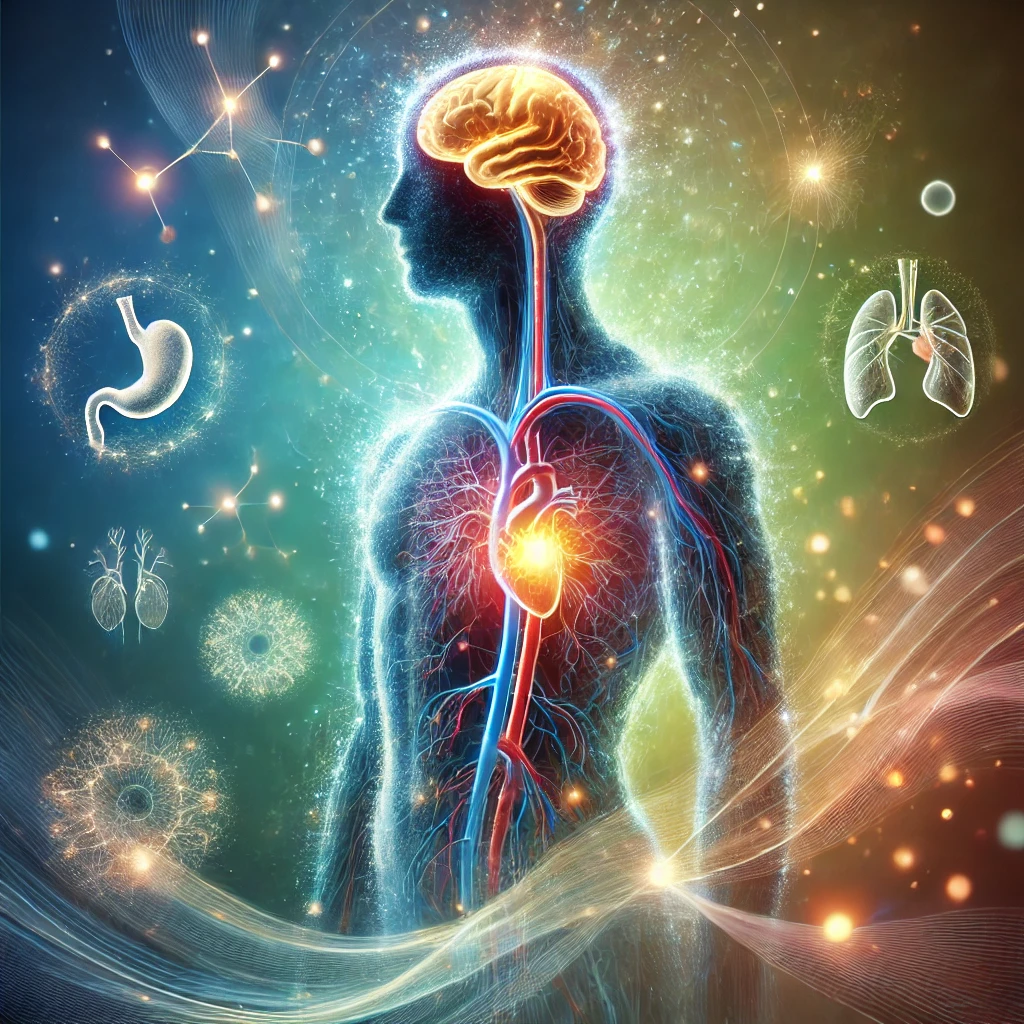Mind-Body Connection: How Stress Affects Your Physical Health
In our fast-paced, modern world, stress has become a ubiquitous part of daily life. Whether it’s the pressure of work, financial worries, or personal challenges, stress can significantly impact our mental well-being. But what many people may not realize is that stress doesn’t just affect our minds—it can also have profound effects on our physical health. In this two-part series, we’ll explore the fascinating connection between the mind and body, and delve into how stress can manifest in physical symptoms or conditions.
Understanding the Mind-Body Connection
The concept of the mind-body connection refers to the interdependent relationship between our mental and physical states. Our thoughts, emotions, and attitudes can directly influence our physical health, and conversely, our physical health can impact our mental well-being. This connection is deeply rooted in the way our body responds to stress, with various physiological systems working in concert to manage perceived threats.
When we experience stress, our body triggers the “fight-or-flight” response, a survival mechanism that prepares us to deal with danger. This response involves the release of stress hormones like cortisol and adrenaline, which lead to increased heart rate, heightened alertness, and a surge of energy. While this response can be helpful in short bursts, chronic stress can keep the body in a constant state of arousal, leading to negative health outcomes.
How Stress Affects the Nervous System
The nervous system plays a central role in the mind-body connection, particularly through the autonomic nervous system (ANS), which regulates involuntary functions like heart rate, digestion, and respiratory rate. The ANS is divided into two branches: the sympathetic nervous system (SNS), responsible for the fight-or-flight response, and the parasympathetic nervous system (PNS), which promotes relaxation and recovery.
When stress activates the SNS, the body prepares for action by increasing heart rate, constricting blood vessels, and slowing down non-essential functions like digestion. If the stressor persists, the SNS remains active, which can lead to chronic health issues such as hypertension, digestive problems, and immune system suppression.
Conversely, the PNS is responsible for the “rest-and-digest” response, which counteracts the effects of the SNS and helps the body return to a state of balance. Chronic stress can disrupt this balance, making it difficult for the PNS to function effectively, thereby impairing the body’s ability to recover and heal.
The Impact of Stress on the Immune System
One of the most significant ways stress affects physical health is through its impact on the immune system. The immune system is responsible for defending the body against infections, illnesses, and diseases. However, chronic stress can weaken the immune system, making the body more susceptible to infections and slowing down the healing process.
When the body is under stress, the release of cortisol can inhibit the production of cytokines, which are essential for immune response. This suppression of the immune system can lead to increased susceptibility to colds, flu, and other infections. Additionally, chronic stress has been linked to the development of autoimmune diseases, where the immune system mistakenly attacks healthy cells in the body.
Stress and Cardiovascular Health
The cardiovascular system is another area where the effects of stress are particularly evident. Chronic stress can contribute to the development of heart disease, hypertension, and other cardiovascular conditions. When the body is in a constant state of stress, the prolonged activation of the SNS leads to increased heart rate and elevated blood pressure, which can damage the blood vessels and arteries over time.
Moreover, stress can lead to unhealthy behaviors such as overeating, smoking, and lack of exercise, which further increase the risk of cardiovascular disease. Studies have shown that people who experience high levels of stress are more likely to develop heart disease, suffer from heart attacks, or experience stroke.
Stress and Digestive Health
The digestive system is highly sensitive to stress, and many people experience gastrointestinal symptoms when they are anxious or overwhelmed. The brain and the gut are closely connected through the gut-brain axis, a communication network that links the central nervous system with the enteric nervous system in the digestive tract.
When stress activates the SNS, it can disrupt the normal functioning of the digestive system, leading to issues such as acid reflux, irritable bowel syndrome (IBS), and even ulcers. Chronic stress can also affect the balance of gut bacteria, contributing to inflammation and other digestive disorders.
Stress and Musculoskeletal Health
Stress can also take a toll on the musculoskeletal system, leading to muscle tension, pain, and discomfort. When we are stressed, our muscles tend to contract and tighten, which can result in headaches, back pain, and other musculoskeletal issues. Over time, chronic muscle tension can lead to conditions such as tension headaches, migraines, and temporomandibular joint (TMJ) disorders.
Furthermore, stress can exacerbate existing musculoskeletal conditions such as arthritis, fibromyalgia, and chronic pain syndromes. The constant release of stress hormones can increase inflammation in the body, worsening pain and discomfort.
In our exploration into the mind-body connection, we’ve seen how stress can have a profound impact on various physiological systems, from the nervous and immune systems to cardiovascular, digestive, and musculoskeletal health. The chronic activation of the stress response can lead to a wide range of physical symptoms and conditions, highlighting the importance of managing stress effectively.
Let’s delve into the specific physical symptoms that can arise from chronic stress and explore practical strategies for managing stress to improve both mental and physical health. Stay tuned for more insights on how to protect your well-being by nurturing the mind-body connection.
We discussed how stress impacts various physiological systems, including the nervous, immune, cardiovascular, digestive, and musculoskeletal systems. We learned that chronic stress can lead to a wide range of physical health problems. In this second part, we’ll explore specific physical symptoms and conditions that can arise from chronic stress and offer practical strategies for managing stress to support both mental and physical health.
Common Physical Symptoms of Chronic Stress
Chronic stress can manifest in a variety of physical symptoms, some of which may be subtle and easily overlooked. Recognizing these symptoms is crucial for addressing the root cause and preventing further health complications. Here are some common physical symptoms associated with chronic stress:
1. Headaches and Migraines
Tension headaches are one of the most common physical manifestations of stress. The constant muscle tension caused by stress can lead to persistent headaches, which may worsen into migraines in some cases. Migraines can be debilitating, causing intense pain, sensitivity to light and sound, and nausea.
2. Sleep Disturbances
Stress can significantly disrupt sleep patterns, leading to insomnia, difficulty falling or staying asleep, and restless sleep. Lack of sleep can, in turn, exacerbate stress, creating a vicious cycle that can be challenging to break. Chronic sleep deprivation can also lead to other health issues, such as weakened immune function and increased risk of chronic conditions.
3. Gastrointestinal Issues
As mentioned in Part 1, stress can wreak havoc on the digestive system, leading to symptoms such as stomach pain, bloating, diarrhea, constipation, and acid reflux. Individuals with chronic stress may also experience a loss of appetite or, conversely, engage in stress eating, leading to weight fluctuations.
4. Fatigue and Low Energy
Chronic stress can drain your energy levels, leading to persistent fatigue and a lack of motivation. This fatigue is often not relieved by rest and can significantly impact daily functioning and quality of life.
5. Muscle Tension and Pain
Muscle tension, particularly in the neck, shoulders, and back, is a common symptom of stress. This tension can lead to pain and discomfort, which may become chronic if not addressed. Stress can also worsen conditions such as arthritis and fibromyalgia, increasing pain and inflammation.
6. Chest Pain and Rapid Heartbeat
Stress can cause physical sensations such as chest pain, a racing heart, or palpitations. While these symptoms are often related to anxiety, they can be alarming and should be evaluated by a healthcare professional to rule out any underlying cardiac conditions.
7. Skin Problems
Stress can exacerbate skin conditions such as acne, eczema, and psoriasis. The release of stress hormones can lead to increased oil production, inflammation, and a weakened skin barrier, making the skin more susceptible to breakouts and irritation.
Long-Term Health Conditions Linked to Chronic Stress
When stress becomes a chronic condition, it can contribute to the development of long-term health issues. Some of the most common stress-related conditions include:
1. Cardiovascular Disease
As discussed earlier, chronic stress can lead to hypertension, atherosclerosis (hardening of the arteries), and increased risk of heart attack and stroke. Managing stress is crucial for maintaining cardiovascular health and preventing these serious conditions.
2. Diabetes
Chronic stress can affect blood sugar levels, increasing the risk of developing type 2 diabetes. Stress can also make it more challenging to manage existing diabetes, leading to complications.
3. Gastrointestinal Disorders
Stress is a significant factor in the development and exacerbation of gastrointestinal disorders such as irritable bowel syndrome (IBS), gastroesophageal reflux disease (GERD), and peptic ulcers.
4. Mental Health Disorders
While stress directly impacts physical health, it is also a significant risk factor for mental health disorders such as anxiety, depression, and post-traumatic stress disorder (PTSD). These conditions can further exacerbate physical symptoms, creating a complex interplay between mind and body.
Practical Strategies for Managing Stress
Given the profound impact of stress on physical health, it’s essential to adopt strategies that help manage and reduce stress effectively. Here are some practical approaches to consider:
1. Mindfulness and Meditation
Practicing mindfulness and meditation can help calm the mind, reduce anxiety, and promote relaxation. Techniques such as deep breathing, progressive muscle relaxation, and guided imagery can help activate the parasympathetic nervous system, promoting a state of rest and recovery.
2. Regular Physical Activity
Exercise is a powerful stress reliever that can boost mood, improve sleep, and enhance overall well-being. Aim for at least 30 minutes of moderate-intensity exercise most days of the week, incorporating activities that you enjoy, such as walking, cycling, yoga, or dancing.
3. Healthy Nutrition
A balanced diet rich in whole foods, lean proteins, healthy fats, and plenty of fruits and vegetables can support overall health and resilience to stress. Avoid excessive caffeine, alcohol, and sugary foods, as these can exacerbate stress and anxiety.
4. Adequate Sleep
Prioritizing sleep is essential for managing stress and supporting overall health. Aim for 7-9 hours of quality sleep per night, and establish a consistent sleep routine that includes winding down before bed, avoiding screens, and creating a calming sleep environment.
5. Social Support
Connecting with friends, family, and loved ones can provide emotional support and help buffer against the effects of stress. Make time for social activities, share your feelings with others, and seek support when needed.
6. Professional Help
If stress is overwhelming or causing significant distress, consider seeking help from a mental health professional. Therapies such as cognitive-behavioral therapy (CBT), mindfulness-based stress reduction (MBSR), and counseling can provide valuable tools for managing stress and improving mental health.
The mind-body connection is a powerful concept that highlights the intricate relationship between our mental and physical health. Chronic stress can lead to a wide range of physical symptoms and long-term health conditions, underscoring the importance of effective stress management. By understanding the impact of stress on the body and adopting strategies to reduce stress, you can support your overall well-being and enhance your quality of life.
Remember, taking care of your mental health is just as important as taking care of your physical health. Nurture the mind-body connection by practicing self-care, seeking support when needed, and making lifestyle choices that promote balance and resilience. Your body and mind will thank you.













Recent Comments